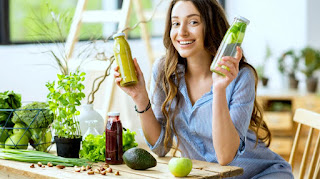Most of you know the significance and benefits of water, so
today we are going to talk about different and unheard topics on water i.e
different types of water, what time should we have water? Can it be had along
with food?
When is the right time to drink water?
It’s important to hydrate yourself first thing in the
morning on empty stomach to detoxify your system and get rid of unwanted free
radicals that has been left behind due to last night’s outing-binge eating and
drinking.
Secondly most people often have this question? Can I drink
water along with lunch or dinner? As much as you can, try and drink water
before lunch or dinner and keep a time period of 30 mins after lunch and
dinner, to sip on more water.
Thirdly during workout, it’s important to drink water
before, during and after workout to prevent your body from the effects of
dehydration.
In addition, whenever your body requires water, your body
will automatically ask for water. Thus, it’s important to listen to your body
and understand when it’s important to hydrate.
Also did you know that fatigue is one of the signs of
dehydration? So next time you want you’re heading for a meeting or an activity
and you feel drained out, drink a glass of water.
Sun-charged water
In ancient times, sun charged water was used by many due to
its healing properties. Sun-charged water can be made by putting a glass jug of
clean, filtered drinking water in the sun for 5 to 8 hours. This solar-charged
water should not be left exposed overnight or after sunset and should be stored
and consumed within 24 hours. This can be ingested or applied to the body while
bathing.
Some of the benefits of drinking sun-charged water are
anti-viral, anti-fungal and anti-bacterial properties. Other benefits include
increased energy, rejuvenation, delayed ageing etc.
We all know that consuming copper vessel water has lots of
health benefits and has been used since ancient times, but did you know another
fact, that when you store water in a copper vessel and water is with a low pH
or chlorinated, copper can react with the water and form soluble salts. This
salts in water when gets into the body will cause an upset stomach. So, all
those people who feel uncomfortable in stomach or get acidity or diarrhoea
after drinking copper vessel water you now you know the reason.
Alkaline water
There is a new trend, “alkaline water purifier” which is
believed to make the body alkaline.
I have lots of people coming and asking if they should
invest lakhs of Rupee on the new purifier in the market.
So, first of all know what alkaline water is,
Alkaline water is water that is slightly basic. It contains
basic minerals such as calcium, magnesium, or bicarbonate. These compounds bind
to hydrogen ions in solution, making the water more basic.
Natural alkaline water sources are usually springs, or a
reservoir of natural water underneath the earth's surface. The rock structures
holding the water may have basic minerals, such as calcium or limestone that
leak into the water, increasing the pH.
Alkaline water purifier came into existence because they
were believed to have many perks especially benefiting people with
inflammation.
But do you think this will completely cure you? Should you
invest in alkaline water purifier to get rid of inflammation?
Our opinion is,
A Normal person leading a good lifestyle and eating right
food will not be acidic and wouldn’t need Alkaline water to make the body
alkaline and the body will be in alkaline state already. But if you have
Inflammation and acidity, it can be managed by following a holistic approach i.e.,
eating a balanced meal, not following a crash or fad diet, dealing with stress,
sleeping well, doing breathing exercises, drinking a lot of water, being
active, avoiding intake of preservatives and packaged foods as these foods are
the main culprit that gets your body into acidic mode.
By following a holistic approach, you can get your body in
an alkaline mode and you won’t need any expensive water purifier to heal you.
Copper vessel water
We all know that consuming copper vessel water has lots of
health benefits and has been used since ancient times, but did you know another
fact, that when you store water in a copper vessel and water is with a low pH
or chlorinated, copper can react with the water and form soluble salts. This
salts in water when gets into the body will cause an upset stomach. So all
those people who feel uncomfortable in stomach or get acidity or diarrhoea
after drinking copper vessel water you now you know the reason.









